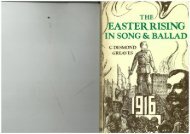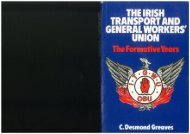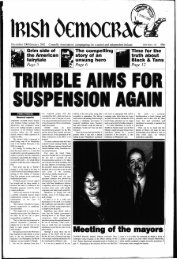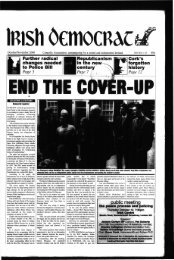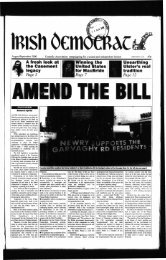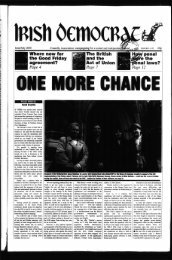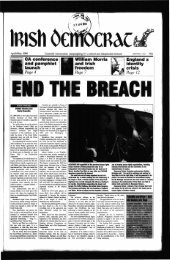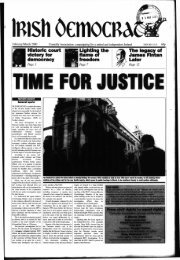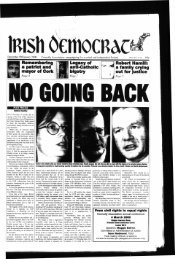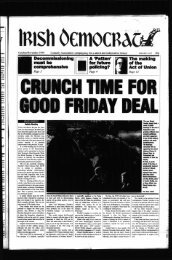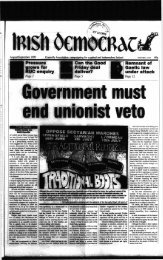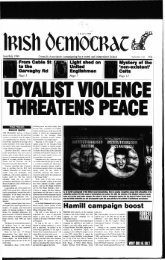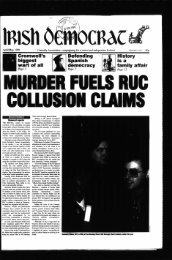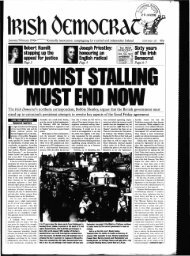Irish Democrat June 1990
Create successful ePaper yourself
Turn your PDF publications into a flip-book with our unique Google optimized e-Paper software.
~ 5 5<br />
OBITUARY<br />
No path for a<br />
wimp<br />
ABOUT 15 years ago I acquired a radio cassette recorder,<br />
and, living in Lancashire with excellent<br />
RTE reception, made a hobby of recording its best.<br />
On St Patrick's Day 1 recorded the sweet lilting<br />
<strong>Irish</strong> of a Protestant service from Cork, and Ecumenical<br />
Service, also in <strong>Irish</strong>, and an <strong>Irish</strong> Mass from Maynooth.<br />
The chief Maynooth celebrant was the College's President,<br />
Monsignor Tomas O'Fiach.<br />
The Cosgrave coalition was then in office and its most<br />
noteworthy spokesman was Conor Cruise O'Brien, Minister<br />
for Posts and Telegraphs and chief overseer of RTE.<br />
O'Fiach's accent lacked the musicallity of Cork, or indeed,<br />
Belfast, having the harsh edge of South Armagh and North<br />
" Louth.<br />
But to my ears his sermon was music.<br />
He started with the observation that for some fashionable<br />
trendsetters to be <strong>Irish</strong> and Catholic were causes for shame<br />
and breastbeating.<br />
He spoke of the life of St Patrick.<br />
His discourse was peppered with words such as 'neart'<br />
(strength) and 'croga' (brave) which in <strong>Irish</strong> have a resonance,<br />
not found in English, which the Greeks called onomatopoeia,<br />
to indicate that to follow St Patrick was no path for a<br />
wimp.<br />
It was not a political sermon, textually, but the Minister<br />
for Posts and Telegraphs, if he heard it, (and he collected<br />
subversive' letters from the newspapers) must have welcomed<br />
it like a Semtex enema.<br />
It surprised and delighted me when O'Fiach was raised to<br />
the See of Patrick. The media 'stick' he got both sides of the<br />
<strong>Irish</strong> Sea was entirely predictable.<br />
It wasn't till I spoke to a friend from Crossmaglen that I<br />
realised what a really popular man O'Fiach was with the<br />
laity. For all the bunkum about the <strong>Irish</strong> being priest-ridden,<br />
the most pious Catholics among them can be scathing about<br />
their clergy. And one priest, when I mentioned what a good<br />
press a certain bishop had had, assured me the Diocesan<br />
clergy regarded him as a shit, a verdict he endorsed heartily.<br />
It's been a sad spectacle these past couple of decades to<br />
see <strong>Irish</strong> men and women, some of real talent and learning,<br />
selling their souls and their country, for a well paid job, or<br />
an approving editorial, in London, Brussels, or - god help us!<br />
- Dublin.<br />
Of those who bucked the trend the outstanding examples<br />
were Tomas O'Fiach and Cearbhaill O'Dalaigh. I believe<br />
both will retain a warm place in <strong>Irish</strong> hearts when their detractors,<br />
if remembered at all, will have joined the Quislings<br />
of Norway and the collaborators of Vichy France, in the dustbin<br />
of European history.<br />
I had a glimpse of the effect O'Dalaigh had on those who<br />
met him from an Englishwoman who worked as a translator<br />
at the European Court when he was a judge there. She had<br />
no interest in nor knowledge of politics, nor did I mention<br />
O'Dalaigh to her. She said he was a lovely man, well-liked<br />
by all who had dealings with him.<br />
Vet, when he was President of Ireland, a Yahoo of a<br />
Defence Minister call him a 'thundering disgrace' to <strong>Irish</strong> sol<br />
diers, who, led by their Chief of Staff, applauded the insult.<br />
The key positions in <strong>Irish</strong> affairs could do with more like<br />
Tomas O'Fiach rind Cearbhaill O'Dalaigh, who brought to<br />
their high offices culture and courtesy, and the character,<br />
when circumstances demanded, to kick against the pricks.<br />
D DONAL KENNEDY<br />
Sean fhocail agus abairti<br />
Le Seamus 0 Cionnfhaoia<br />
1. Ta se chomh gasta leis na beacha: he is as cute as the bees<br />
2. Ni! aon bheann agat air: you need not care how the (storm) of winter<br />
will l.cvj<br />
3. Talamh maith chur, beatha a tiuirt: good land for crop<br />
4. Thug s6 an bhion6g sin as a chabail: he made sudden spring (out<br />
ol his body)<br />
5. Nach grdnna ari bhiuch e ar dhuine uasal mar e?: is that not an evil<br />
quality in a gentleman like him?<br />
6. Bean chabhra: a midwife<br />
7. Nior chuir aon dulne aon spfach orm: no-one annoyed me, interfered<br />
with me<br />
8. Cuir s6 spraoch as: he sneezed (alr,o sprae)<br />
9. Dein taca do: help him in lifting<br />
10. Thug m6 urmhur an lae Inne ins na faillte: I spent the greater part<br />
of yesterday on the cliffs<br />
IRISH DEMOCRAT <strong>June</strong> <strong>1990</strong> page 6<br />
IRISH SONGS EDITED BY PATHICh<br />
Matt Hyland<br />
There was a lord lived in this town,<br />
Who had a handsome comely daughter,<br />
Was courted by a fair young man,<br />
Who was a servant to her father,<br />
But when her parents came to know,<br />
They vowed they'd make him leave the island,<br />
This lady knew her heart would break,<br />
Had she to part with young Matt Hyland.<br />
The lord discoursed with his dear wife fair,<br />
One night alone in their bed-chamber,<br />
"Matt Hyland I will send afar,<br />
I fear my child doth stand in danger."<br />
This lady gay in ambush lay,<br />
While deep depressed she lay repining,<br />
"My father I will him deceive,<br />
Won't I protect my own Matt Hyland."<br />
Straightway off to her love she went.<br />
And ordered him for to awaked,<br />
Saying "arise my dear and go your way,<br />
For this night you will be taken,<br />
Last night i hc^rd my father say,<br />
In spite of fate he would transport you,<br />
So arise my dear and leave this place,<br />
For you know well I do adore you."<br />
"Oh must I go away?" he said,<br />
"Oh must I go without my wages,<br />
Without a shilling in my purse,<br />
Just like a poor forlorn stranger?"<br />
"Here's fifty shillings in bright gold,<br />
Ain't that far more than my father owes you?<br />
So arise my dear and go your way,<br />
For I wish to God I'd gone before you."<br />
'Twas on a bank they both sat down,<br />
Just for the space of on half-hour,<br />
And not a word did either speak,<br />
But down their cheeks the tears did pour,<br />
She laid her head upon his breast,<br />
Around his neck her arms entwined them<br />
"No lord nor duke nor earl I'll wed,<br />
I'll wait for you, my own Matt Hyland."<br />
The lord surveyed his daughter's plight,<br />
One night alone as she lay crying,<br />
"I will give you leave to bring him back,<br />
Since there's no one you style above him."<br />
She wrote a letter then in haste,<br />
For him her heart was still repining,<br />
She brought him back, to the church they wen<br />
And she made a lord of young Matt Hyland.<br />
The Old Bog Road<br />
My feet are here on Broadway<br />
This blessed harvest morn,<br />
But oh, the ache thaf s in my heart<br />
For the spot where I was born.<br />
My weary hands are blistered<br />
Through toil in cold and heat<br />
But oh, to swing a scythe again<br />
Through a field of <strong>Irish</strong> wheat.<br />
Had I the chance to wander back<br />
Or own a king's abode<br />
Ifs soon I'd see the hawthorn tree<br />
By the Old Bog Road.<br />
When I was young and restless<br />
My mind was ill at ease<br />
Through dreaming of America<br />
And the gold beyond the seas.<br />
Oh sorrow take their money!<br />
'Tis hard to find the same<br />
And whafs the world to any man<br />
Where no one speaks his name?<br />
I've had my day and here I am<br />
A-building bricks per load<br />
A long three thousand miles away<br />
From the Old Bog Road.<br />
My mother died last springtime<br />
When Ireland's fields are green<br />
And the neighbours said her waking<br />
Was the finest ever seen.<br />
Snowdrops and primroses<br />
Piled up beside her bed<br />
And Ferns church was crowded<br />
When the funeral Mass was said -<br />
And here was I on Broadway<br />
A-building bricks per load<br />
When they carried out her coffin<br />
Down the Old Bog Road.<br />
**-. »<br />
Ah, life's a weary puzzle<br />
Past finding our by man<br />
I'll take each day for what it's worth<br />
And do the best I can;<br />
Since no one cares a rush for me<br />
What point is there to moan?<br />
I'll go my way and draw my pay<br />
And smoke my pipe alone.<br />
Each human heart must bear its grief.<br />
Though heavy be the load.<br />
So God be with you Ireland<br />
And the Old Bog Road.<br />
Thank You Ma'am Says Dan<br />
"What brought you into my house,<br />
To my house, to my house,<br />
What brought you into my house?"<br />
Said the mistress unto Dan.<br />
"I came here to court your daughter, ma'am,<br />
I thought it no great harm, ma'am."<br />
"Oh, Dan, me dear, you're welcome here."<br />
"Thank you ma'am," says Dan.<br />
"How came you to know my daughter,<br />
Mv daughter, my daughter,<br />
How came you to know my daughter?"<br />
Said the mistress unto Dan.<br />
"going to the well for water, ma'am,<br />
To raise the can 1 taught her ma'am."<br />
"Oh, Dan, 'tis you're the handy man."<br />
"Thank you ma'am," says Dan.<br />
"She's a bonny girl, your daughter,<br />
Your daughter, your daughter,<br />
She's a bonny girl, your daughter,<br />
And I like her well," said Dan<br />
"She's a girl that's fit for any man<br />
And has a gradh for you, dear Dan.<br />
Oh, Dan, me dear, you're welcome here."<br />
"Thank you ma'am," says Dan.<br />
"Oh you can have my daughter,<br />
My daughter, my daughter,<br />
yes you can have my daughter."<br />
Says the mistress unto Dan.<br />
"But when you take my daughter, Dan,<br />
Of course, you'll take me also, Dan,<br />
oh, Dan, me dear, you're welcome here,"<br />
"Thank you, ma'am," says Dan.<br />
This couple, they got married,<br />
Got married, got married,<br />
This couple, they got married,<br />
Miss Elizabeth and Dan.<br />
And now he keeps her mother,<br />
And her father and her brother and,<br />
"Oh, Dan, 'tis you're the lucky man,"<br />
"Go to Hell," says Dan.<br />
BOOK S /'AGE<br />
CONOR FOLEY previews ITV's four-hour epic on the 'shoot-to-kill' affair<br />
HOOT TO KILL is a four<br />
1 hour epic reconstruction of<br />
k the six killings in Armagh in<br />
11982 that Stalker was sent to<br />
f<br />
investigate,andtheconspiricy<br />
of lies he came up against. It<br />
inishes With his removal from the<br />
inquiry just as it reached its climax.<br />
The firsthalf is being screened on the<br />
ITV network on Sunday 3 <strong>June</strong> with<br />
the second half being shown the following<br />
night.<br />
It is beautifully filmed and well<br />
acted and directed. Panoramic and<br />
slow paced if allows the real drama<br />
of the events to unfold in a compelling<br />
fashion. It underlines how much<br />
material there would be for some really<br />
good <strong>Irish</strong> war films if companies<br />
had the guts to make them.<br />
Despite its name, Shoot To Kill does<br />
not place the Armagh killings in their<br />
political perspective. There is very<br />
little background information about<br />
the conflict or even mention of the<br />
other executions which took place<br />
during the same period, the three<br />
incidents are portrayed as botched<br />
revenge for the death of three RUC<br />
men blown up by the IRA in the area.<br />
Nevertheless, the implication of the<br />
film is that shoot to kill is a standard<br />
xjlicy in the province, condoned at<br />
he most senior levels so long as the<br />
murders are not too blatant. When.<br />
John Hermon, convincingly portrayed<br />
by TP McKenna, hears of the<br />
lirst killing for instance, he immediately<br />
tells his press officer to stress<br />
he fictitious injury suffered by an<br />
3UC man—Hie CID officer who appears<br />
at the scene of the killing is<br />
similarly compliant in not interviewing<br />
any of the RUC unit until they<br />
li&ve had a chance to make up their<br />
story about a non-existent road<br />
block. Quite clearly the only reason<br />
why these particular executions became<br />
the subject of an inquiry was<br />
because firstlythey were "cock-ups"<br />
within the RUCs own terms of reference,<br />
secondly they came so close<br />
together and thirdly the lies came out<br />
in a courtroom. .<br />
There are some brilliantly subtle<br />
touches, like the servility of a gardai<br />
officer who accidentally holds up an<br />
v<br />
under cover RUC unit making a<br />
cross-border incursion. A quote<br />
from Chief Inspector Flanagan, who<br />
organised both the murders and the<br />
cover-up, to one of his subordinates<br />
that "the Official Secrets Act requires<br />
you say what I tell you to say" is only<br />
equalled by Pat Finucane's sardonic<br />
Pyella Ignota<br />
deserve.<br />
Kevin Barry and his Time, Donal O'Donovan, Glendale What stands out clearly is the careless unconcern<br />
Publications £7.95 paperback<br />
of leaders who sent out a civilian lad to fight<br />
against professional killers, and gave him no better<br />
weapon than a gun which was out of action. His<br />
38 Mauser automatic was made in 1915 and was<br />
THIS BOOK was written by a nephew of Kevin numbered RJR 995 KN2. And it was useless for<br />
Barry, and as a member of the family he had anything. When you read the story for yourselves,<br />
access to the clan lore and the relevant documents<br />
forthis work. He also had great help from British on a plate, by his very own people, for<br />
you will see that young Barry was handed to the<br />
the research already done by Mr ODonovan Senior<br />
who had once written an unpublished book The book contains transcripts of telegrams ex-<br />
whom he had dedicated himself.<br />
about Kevin,<br />
changed, messages sent, words from the exchanges<br />
at the trial. It is obvious that Kevin was to<br />
the introduction by Tim Pat Coogan is in itself<br />
worth reading. He describes Bany's death as a be executed anyway, evidence or no evidence.<br />
media event, and leads us to think of how our The hypocrisy and double standard of the highest<br />
martyrs today tend to be hidden away in disgrace, authorities come out in the clear, lite British used<br />
or their bodies reviled and desecrated.<br />
the very same tactic that they still use wherever<br />
The narrative proper is also very readable and they are. They treated the War of Liberation as a<br />
immediately gripping It is, however unemotional criminal episode, and the <strong>Irish</strong> soldiers as murderers.<br />
Which is ironical coming frompeople who<br />
and objective, very low-key, with no dramatic effects.<br />
There is a very little touch of hero worship, exterminated whole races and even carried away<br />
maybe, which is refreshing in these days of herohatred.<br />
The imperial arrogance and immorality is always<br />
the bones to Britain.<br />
Aflsinsta "idrop of blazing Dublin, we see the there. Young Barry was not shot as a soldier but<br />
sacrificial i es, larger than life, their actions hanged as a criminal, although he was a prisoner<br />
tremendous* but the rhetoric subdued- They were of war. Barry's nobility is manifest throughout, in<br />
rtvwe of whom the land was not worthy. They his calm acceptance of his fete. He adjured his<br />
represent a yesterday which today may not sister, Kathy, to make sure that there would be no<br />
comment to Stalker that the rightto<br />
silence has not been taken away yet.<br />
Subsequent events give added.significance<br />
to the venom with which an<br />
RUC officer screams at Stalker for<br />
having that conversation.<br />
Stalker and his deputy, who acted<br />
as the film's consultant, are the only<br />
two people whose characters are<br />
treated in any depth but the film is<br />
less guilty of using "the natives" as a<br />
backdrop for an English/American<br />
hero than most of those currently circulating<br />
about Vietnam or Central<br />
America.<br />
Instead they are portrayed as incredulous<br />
outsiders gradually realising<br />
what a corrupt, sectarian cess-pit<br />
they have wandered into. "They're<br />
out of control" says Stalker.as he realises<br />
that the CID man who investigated<br />
the killings had himself<br />
ordered the doctoring of evidence<br />
and Judge Gibson commends an<br />
RUC unit for bringing three unarmed<br />
men "to the final court of justice".<br />
"These people are more li)tir death<br />
squads from a Banana Republic"<br />
concludes the Manchester police<br />
man only to have the words thrown<br />
back at him when Flanagan taunts<br />
them that the inquiry team's office<br />
has been bugged fromthe start.<br />
The RUC's growing confidence<br />
comes fromthe knowledge that Stalker<br />
is being set up through their contacts<br />
across die water which results<br />
in his suspension and removal from<br />
the inquiry. His subsequent fate, and<br />
those of the other main characters,<br />
are summarised in brief texts before<br />
the finalcredits. Notable exceptions<br />
are Michael Tighe, Eugene Toman,<br />
Sean Burns, Gervais McKerr, Roddy<br />
Carroll and Seamus Grew, six dead<br />
men who who have been joined by<br />
many others since then.<br />
So don't stop being angry when the<br />
film ends.<br />
• ••<br />
appeal. He also sealed his own fate by .fefiisutg to<br />
give any information tohis interrogators. The contrast<br />
is great between his magnanimity and the<br />
peevish, stupid vindictiveness of the British. He<br />
was reluctant to complain of the ill-treatment he<br />
had received in the interrogation and gave bare<br />
details in an understated way. It was clear to all<br />
who saw him that his arm was in a sling, but the<br />
authorities were livid with anger that a legal figure<br />
drew attention to the feet.<br />
This work contains many ballads and poems<br />
written about Barry and his death, which was<br />
highly memorable amdng patriot deaths. He was<br />
pre-eminent as a martyr because many families<br />
were so grateful to him for not breaking under<br />
interrogation. Also there may have been understandable<br />
remorse Oat he had been so easily and<br />
with such insouciance, thrown to the wolves.<br />
The toneof the narrative is so calm and restrained<br />
that it acts as an anaesthesia against the full horror<br />
of the events. The official reassurance was that the<br />
death was instantaneous, but who believes the<br />
voice of obsessive executioners? This is an inspiring<br />
episode in the history of Ireland, and the<br />
author deserves our gratitude for getting it into<br />
print before the revisionists get a chance to destroy<br />
this heroic figure as they have done so many<br />
others. This book is to be had at the Four Provinces<br />
Bookshop and it is the read of a lifetime!<br />
Chronicle of<br />
constant<br />
Constance<br />
Doris Daly<br />
Constance Markievicz • an<br />
Independent Life, Anne Haverty,<br />
Pandora Press £7.95<br />
THIS BIOGRAPHY, published<br />
1988, of the Countess Msrklevlcz<br />
brings a new dimension to<br />
the life and times of Constance<br />
Georglna Gore-Booth and<br />
brings up the major figures of<br />
her day Into a bas-relief on<br />
backdrop of luminaries who so<br />
Influenced and shaped her<br />
extraordinary life and Indeed<br />
helped shape the events on Europe's<br />
mainland and Its Islands<br />
at the turn of the century, events<br />
that have not yet been resolved!<br />
Constance wae born In the shadow<br />
of Buckingham Palace into<br />
an <strong>Irish</strong> aristocratic family on her<br />
father's side, and related to Lord<br />
Scarborough on her mother's<br />
side, on February 4th 1868. She<br />
was reared In Idyllic splendour<br />
St Llssadel Court, County SHgo<br />
within the sight of magical Ben<br />
Bulban and the volatile Atlantic<br />
Ocean, the natural kingdom of<br />
King Lyr: an indication of her<br />
natural development?<br />
She died penniless In a public<br />
ward of Sir John Dunne's Hospital,<br />
OubHn on July ISth 1827, her<br />
daughter Maeve by her aids.<br />
The Free State Government refused<br />
to allow her mortal remains<br />
to lie In State at the<br />
Mansion House so she lay instead<br />
in the Rotunda Clnemecum-dancehall<br />
for two days and<br />
nights guarded by her own boys<br />
of Flanna nah Elreann aa they<br />
people of Dublin, vety particularly<br />
the poor, paid their reapectato<br />
this the greatest of <strong>Irish</strong> heroines.<br />
Authoress Anne Haverty faithfully<br />
chronicles this amazing life<br />
with a clarity gleaned from meticulous<br />
research and an absolute<br />
understanding of the setting<br />
and the political Jasues of Marklevlcz's<br />
lifetime. But to find the<br />
real Maridevicz one has to be<br />
detective and aage and shrewdly<br />
sift between the Nnes to evaluate<br />
Constance the Art Student, the<br />
wife of an Impoverished Polish<br />
count, the traunatiaed postpuerpal<br />
mother, the revolutionary,<br />
the crack ahot In the Citizen<br />
Army, leader of Fianna nah-<br />
Elreann (Boy's Brigade), the<br />
playwright, poet, actreee, the<br />
soldier at aims, the Committee<br />
Q A M l a H a l ||, . — -a n , - ., , H y<br />
socialist, me prisoner, me poetrcian,<br />
the first woman In Europe<br />
Minister of State, the beloved<br />
step-mother and most amazing<br />
of all that of Roman Catholic<br />
Convert!<br />
Ma Haverty leaves no stone unturned<br />
and even consults the<br />
rish Astrological Society for a<br />
Natal Horoecope of Markievicz.<br />
I warmly recommend thle book<br />
and Indeed suggest further reedng<br />
of Curloua Journey by Kenneth<br />
Griffith and Tim O'Grady<br />
and avallabls only from Four<br />
Provlncss Bookshop for ths<br />
special price of £5.<br />
I It t 8 M DIM 0 C It A T 4 * a S 1 8 8 8 f a ft S




